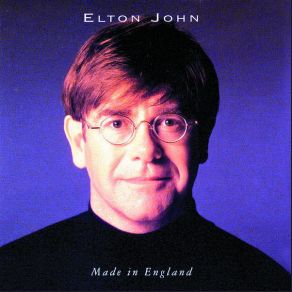Made in England
Download links and information about Made in England by Elton John. This album was released in 1995 and it belongs to Rock, Rock & Roll, Pop, Songwriter/Lyricist genres. It contains 11 tracks with total duration of 52:37 minutes.

|
|
|---|---|
| Artist: | Elton John |
| Release date: | 1995 |
| Genre: | Rock, Rock & Roll, Pop, Songwriter/Lyricist |
| Tracks: | 11 |
| Duration: | 52:37 |
| Buy it NOW at: | |
| Buy on iTunes $4.99 | |
| Buy on Amazon $4.99 | |
| Buy on Amazon $0.33 | |
| Buy on Amazon $0.31 | |
Tracks
[Edit]| No. | Title | Length |
|---|---|---|
| 1. | Believe (featuring Paul Buckmaster) | 4:54 |
| 2. | Made in England | 5:08 |
| 3. | House (featuring Paul Buckmaster) | 4:27 |
| 4. | Cold (featuring Paul Buckmaster) | 5:37 |
| 5. | Pain | 3:51 |
| 6. | Belfast | 6:30 |
| 7. | Latitude (featuring George Martin) | 3:35 |
| 8. | Please | 3:52 |
| 9. | Man (featuring Gavin Christopher) | 5:15 |
| 10. | Lies | 4:28 |
| 11. | Blessed | 5:00 |
Details
[Edit]Made in England could as easily be the follow-up to Elton John's self-titled 1970 album as his first recording since the success of his songs for the Lion King soundtrack. John has brought back some of his old associates, including percussionist Ray Cooper, guitarist Davey Johnstone, and, particularly, orchestrator Paul Buckmaster, who gave the Elton John album its distinctive sound 25 years ago and contributes four string charts here. John remains a musical jukebox: "Please" has a twangy guitar riff that sounds like the Searchers, circa 1965, while guest organist Paul Carrack brings a soulful Booker T.-like feel to "Man." As usual, though, John's main vocal influence remains John Lennon, especially on the album's first single, "Believe," the lyrics to which also echo the tone of several of Lennon's solo ballads. Lyricist Bernie Taupin is unusually personal, writing mostly in short, simple, declarative sentences and giving his songs one-word titles ("House," "Cold," "Pain," etc.). His overall theme posits a positive conclusion ("Blessed") eventually triumphing over adversity ("Lies"). John never works up much feeling for this concept, though he does come off alternately angry and solemn as the lyrics seem to require, though without ever upsetting the melodic flow. It sounds, in other words, as if Taupin had a lot to get off his chest this time around, but his mouthpiece, as usual, was more interested in the sound of the words than in their meaning. Which, given the predictability of the message, seems to have been just as well.